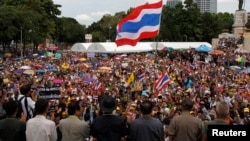BANGKOK —
The Thai government Wednesday took up debate on a controversial bill that gives amnesty to offenders involved in political protests dating back seven years. The bill has also come under criticism from the United Nations and rights groups.
Outside Parliament, hundreds of police with baton shields blocked access to nearby roads after a morning rally in Bangkok’s central Lumpini Park drew more than 2,000 protesters.
The bill proposes a broad amnesty for all those charged with crimes committed during protests and riots that occurred since September 19, 2006 - when Thailand’s military coup drove former Prime Minister Thaksin Shinawatra from power. Thaksin's sister, Yingluck Shinawatra, is the current prime minister.
The bill excludes Thaksin from amnesty, but the opposition in parliament believes it could pardon him from a 2008 corruption conviction, paving the way for his return.
A protestor, who gave her name as Mrs Ping, said the rally was important to demand Thaksin face the jail term handed down by the Supreme Court in 2008.
"It's an important day. We are Thai people [and] disagree with Thaksin Shinawatra because he's already judged by the court. And he has to go to jail and now his young sister [Prime Minister Yingluck Shinawatra] will try to implement the new law. So it's not fair. But it means the Supreme Court judgement has no meaning at all," she complained.
The bill’s supporters say it targets lower ranking protestors who face jail or court over the protests - including both supporters and opponents of Thaksin, dating back to 2006.
Thitinan Pongsudhirak, a political scientist at Chulalongkorn University, said the government is likely to move forward with the bill, because of its strong backing among Pheu Thai supporters known as “Red Shirts.”
"This is something the government will have to bite the bullet on. Otherwise the Red Shirts will be disenchanted and they will be upset with the government and at the same time, the government knows that it needs the support of the red shirts going forward. And I think the Thaksin option, the Thaksin inclusion, is also out of the question,” Pongsudhirak said.
Both the United Nations and Human Rights Watch have criticized the amnesty bill, saying it could pardon people involved in serious rights violations during Thailand’s sometimes violent political upheavals.
The bill, after being read in parliament, will then be vetted by a committee. If passed by parliament and the senate, it could become law by December.
Outside Parliament, hundreds of police with baton shields blocked access to nearby roads after a morning rally in Bangkok’s central Lumpini Park drew more than 2,000 protesters.
The bill proposes a broad amnesty for all those charged with crimes committed during protests and riots that occurred since September 19, 2006 - when Thailand’s military coup drove former Prime Minister Thaksin Shinawatra from power. Thaksin's sister, Yingluck Shinawatra, is the current prime minister.
The bill excludes Thaksin from amnesty, but the opposition in parliament believes it could pardon him from a 2008 corruption conviction, paving the way for his return.
A protestor, who gave her name as Mrs Ping, said the rally was important to demand Thaksin face the jail term handed down by the Supreme Court in 2008.
"It's an important day. We are Thai people [and] disagree with Thaksin Shinawatra because he's already judged by the court. And he has to go to jail and now his young sister [Prime Minister Yingluck Shinawatra] will try to implement the new law. So it's not fair. But it means the Supreme Court judgement has no meaning at all," she complained.
The bill’s supporters say it targets lower ranking protestors who face jail or court over the protests - including both supporters and opponents of Thaksin, dating back to 2006.
Thitinan Pongsudhirak, a political scientist at Chulalongkorn University, said the government is likely to move forward with the bill, because of its strong backing among Pheu Thai supporters known as “Red Shirts.”
"This is something the government will have to bite the bullet on. Otherwise the Red Shirts will be disenchanted and they will be upset with the government and at the same time, the government knows that it needs the support of the red shirts going forward. And I think the Thaksin option, the Thaksin inclusion, is also out of the question,” Pongsudhirak said.
Both the United Nations and Human Rights Watch have criticized the amnesty bill, saying it could pardon people involved in serious rights violations during Thailand’s sometimes violent political upheavals.
The bill, after being read in parliament, will then be vetted by a committee. If passed by parliament and the senate, it could become law by December.




